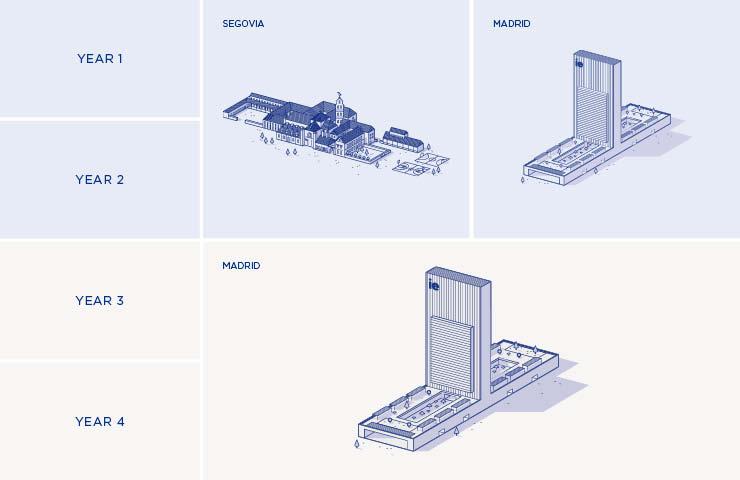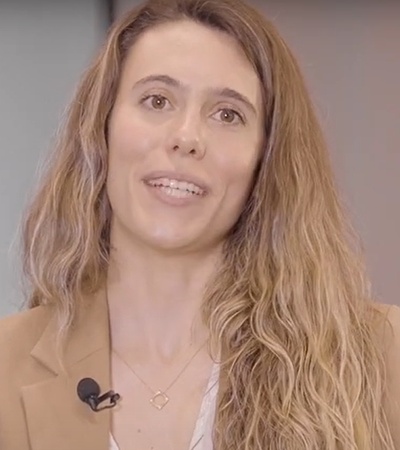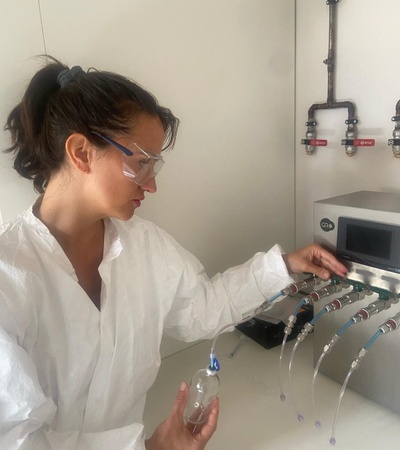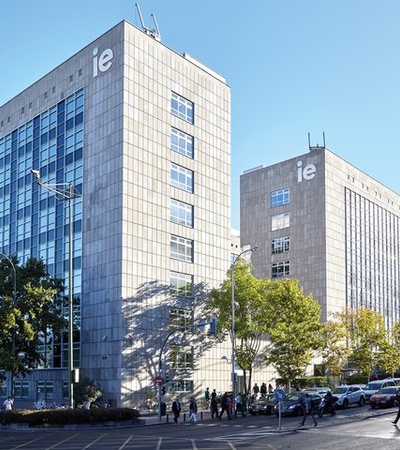Bachelor in Applied Mathematics
Bachelor in Applied Mathematics
Harness applied math to solve real-world challenges
- Home
- Studies
- Undergraduate Degrees
- Bachelor In Applied Mathematics
THE BACHELOR IN APPLIED MATHEMATICS
THE BACHELOR IN APPLIED MATHEMATICS
Applied mathematics enables the modeling of real-life events through mathematical language. By dealing with reality in abstract terms, we are able to simplify aspects of our complex world and obtain solutions to the problems we want to understand and solve. This benefits our graduates at both a personal and professional level. It develops individual problem-solving and analytical skills, which play a strategic role in diverse industries, such as economics, finance, operations, automation, energy and sustainability.
The Bachelor in Applied Mathematics is a demanding program that gives students an in-depth understanding of the application of mathematics across a variety of disciplines to solve real problems. By gaining hands-on experience, you will be prepared to implement the methods learned in any context or industry.
Upon graduation, your newly developed expertise will be evident through increased creativity, critical thinking and the ability to apply mathematics to anything you feel passionate about. Equipped with an undeniable competitive edge in today’s mathematically oriented job market, you will be able to embark on a unique career path in industry or research.

WANT TO KNOW MORE?
WHO IS THIS PROGRAM FOR
WHO IS THIS PROGRAM FOR
IS FOR INDIVIDUALS WHO ARE…
passionate about mathematics and science, with abilities in abstract reasoning, an interest in the practical application of mathematical knowledge through coding, and a strong work ethic.
LOOKING FOR…
a hands-on program that trains students to master mathematical language and cultivate analytical and abstract thinking skills, merging intuition and logical rigor. You will explore classic and novel mathematical concepts and apply them to tackle real-world problems with various programming languages.
TO BECOME...
- an investment analyst at a hedge fund
- a computer vision and robotics expert
- a cryptography and cybersecurity specialist
- a quantitative trader
- a structure and logistics consultant
- a natural language processing specialist
- a machine learning engineer
- a data scientist
- a researcher in artificial intelligence
- an expert in complex systems analysis
Discover Your Potential with the IE Math Challenge
Discover Your Potential with the IE Math Challenge


Location
Location
You can study the Bachelor in Applied Mathematics in Segovia and in Madrid. If you decide to start in Segovia, you will spend year one and year two at the campus in Segovia, before moving to Madrid for year three and four. If you start the program in Madrid, however, you will spend all four years of the program in the Spanish capital.
The possibility of starting this program in Madrid will be available from September 2025.
FACT SHEET
PROGRAM
Bachelor in Applied Mathematics
DURATION
4 years
LANGUAGE
English
CENTRES OF STUDY AND NUMBER OF PLACES
Escuela Politécnica Superior (Segovia) – 50 places
Centro de Estudios Superiores IE (Madrid) – 60 places
CREDITS
Total number of credits: 240 ECTS*
Distribution of credits and subjects**:
Core subjects – 60 ECTS
Mandatory subjects – 108 ECTS
Elective subjects – 60 ECTS
Final Project – 12 ECTS
AREA OF KNOWLEDGE
Mathematics and Statistics
TEACHING METHODOLOGY
Face-to-face
SPANISH MINISTRY’S REGISTRY OF UNIVERSITIES, CENTRES AND DEGREES
ASSURANCE AGENCY
ACSUCYL*** – Buscador Títulos Oficiales
TITLE VERIFICATION RESOLUTION (2023)
*European Credit Transfer System
**The character of the subjects is defined by the Spanish legislation
***Quality Assurance Agency for the University System in Castilla y León
A SURE PATH TO SUCCESS
A SURE PATH TO SUCCESS
Five reasons to take the Bachelor in Applied Mathematics at IE Univeristy.
- 01.
BENEFIT FROM AN APPLIED APPROACH TO MATHEMATICS
This Bachelor of Applied Mathematics program combines theoretical and computational mathematics to equip you with the knowledge and skills to apply mathematical principles in a variety of contexts. From industrial to financial applications, data analysis and even artificial intelligence, you'll learn to tackle real-life problems and devise innovative solutions using the mathematical knowledge gained through our inductive learning method. Anchored in the latest technological and programming tools, the Applied Mathematics Bachelor's Degree offers a comprehensive toolkit for solving complex problems, providing you with a broad spectrum of possible solutions across different industries.
- 02.
MAKE AN IMPACT ON SOCIETY
The program offers unparalleled depth in teaching mathematics and computational skills, setting you on the path to becoming adept at understanding and applying mathematical models to real-world problems. Recognized as the foundation of many of society's critical projects, mathematics enables us to make informed decisions in finance, optimize web dynamics and traffic, and solve complex problems in natural phenomena such as pollination, epidemics and rocket propulsion. This bachelor degree covers a broad spectrum of mathematical fields, from linear algebra and calculus to statistics, analysis, optimization, logical reasoning and algorithms, ensuring you're well-equipped to tackle the challenges of tomorrow with a solid mathematical foundation.
- 03.
PERSONALIZE YOUR STUDIES
In this program, students are advised to build their own curriculum by selecting one of three concentrations where they can apply mathematics: Industrial Mathematics, Artificial Intelligence or Financial Mathematics. Within your electives, you will have the opportunity for further personalization thanks to the guidance of a mentor, who will help guide your decision based on your particular strengths or interests. In this way, you will graduate equipped with a strong professional profile that will make you stand out.
- 04.
A MATH PROGRAM UNLIKE ANY OTHER
The scope of this unique program goes beyond complex algorithm structures and analytical solutions. Surrounded by peers who share your passion for mathematics, you will develop the skills to interpret reality through both a mathematical and a practical lens.
Each course has its own balance of mathematical rigor and real-world applications, supporting the learning process through curiosity, and enabling you to solve the most complex problems that companies, researchers, and society currently face.
Throughout your studies, you will learn from top mathematics experts, who bring real-world insights into the classroom and offer an updated perspective on how mathematics is shaping today’s most pressing innovations.
- 05.
BOOST YOUR CAREER POTENTIAL
There is a vast demand for mathematicians in research, banks, governments and companies in the areas of health, engineering, operations, automation and beyond—the need for skilled mathematicians is on the rise. Employment for mathematicians is projected to grow 33% over the next 10 years and, according to the U.S News and World Report, mathematicians rank #3 in Best Business Jobs. Mathematics plays a central role in a wide range of careers and heavily influences cutting-edge research in various fields. By gaining keen logical skills and the ability to think outside the box, this program will give you a distinct edge in today’s world.
Bachelor in Applied Mathematics Pillars
Bachelor in Applied Mathematics Pillars
A HANDS-ON APPROACH WITH REAL-WORLD APPLICATIONS
This program has been expertly designed to bring mathematical theory to life through practical, engaging methodologies. In your final year, you'll customize your learning journey, applying your knowledge to a range of fields. From the first year, you'll also develop essential transversal skills—such as writing in LaTeX, creating and presenting scientific posters, and drafting scientific manuscripts—while gaining complementary skills through courses like Introduction to Quantum Computing, an entry point into emerging areas of mathematical innovation. Combining deep mathematical concepts with coding skills, this program prepares you to solve real-world challenges and push the boundaries of classical thinking.
CHOOSE YOUR OWN CONCENTRATION
The first two years will focus on mathematical foundations, which will be the pillars for all the different electives offered. In the third and fourth years, you will specialize in the area that interests you the most: Industrial Mathematics, Artificial Intelligence or Financial Mathematics. You will be required to complete your capstone project and encouraged to participate in internships and exchange programs.
VENTURE INTO THE MODELING WORLD
Mathematical modeling empowers individuals to translate practical problems into mathematical formulations. This allows students to draw insights through theoretical and numerical analysis, which can be translated into actionable solutions. A central pillar of this program revolves around developing this all-important skill. Mathematical modeling has wide-reaching and indispensable applications, providing unrivaled precision and a clear direction when it comes to problem-solving. By gaining a deep understanding of current modeling techniques, you will have the invaluable ability to design or control complex systems in fields that range from anthropology and architecture to finance, linguistics and pharmacology, among others.
DRIVE MATHEMATICS IN THE DIGITAL ERA
Modern technology is driving transformation in everything from civil engineering to healthcare with the rise of AI—and it’s all rooted in a mathematical foundation. Without mathematics, science and technology would lack a common language. Many scientific theories and models, such as quantum mechanics or general relativity, are based on highly sophisticated mathematical tools. By studying applied mathematics, you will help drive change with a quantitative approach in areas including big data analysis, statistical analysis and computer calculations.
Undergraduate + Master's Degree Combinations
Undergraduate + Master's Degree Combinations
As an IE University student, you have access to a wide range of opportunities to continue your academic journey and strengthen your global career. Whether you pursue a master’s at IE University or at IENYC in New York, each option is designed to accelerate your personal and professional growth and open doors across industries.
THE DUAL DEGREES OF IE UNIVERSITY
THE DUAL DEGREES OF IE UNIVERSITY
Develop a multidisciplinary profile and specialize in two distinct, yet connected fields, by combining another bachelor degree with your studies in this program.
STUDENT STORIES
STUDENT STORIES
At IE University, more than 75% of our student body comes from outside Spain, representing an average of 130 nationalities on campus each year. We take great pride in these numbers—and in the individuals behind them.
Our students are natural go-getters with a global outlook and a dream of a better future. Regardless of their degrees or passions, they strive every day to unleash their innovative potential and reach their goals. Driving this shared vision are people from a variety of cultures, backgrounds and life experiences. They are both united and entirely unique. These are our students. Discover their stories.
FROM THE ACADEMIC DIRECTOR
FROM THE ACADEMIC DIRECTOR
Irene Alda, Academic Director, explains in-depth the Bachelor in Applied Mathematics.

Faculty Stories
Faculty Stories
Our 500-strong faculty guides students to unleash their potential day in, day out. Their influence across all five Schools can’t be overstated, inspiring young, energetic minds as they define their personal and professional trajectories.
But what kind of person does it take to create such impact? The individuals that make up the IE University faculty are special. Coming from diverse, global backgrounds, they each bring distinct perspectives and innovative ideas that embody what makes IE University stand out. Their stories are personal and unique—but don’t take our word for it. Read their stories to see for yourself.
FACULTY RESEARCH
FACULTY RESEARCH
What sets our faculty apart is their deep integration into the fields they teach. Not only do they work within the industries they are teaching, bringing firsthand knowledge and insights to the classroom, but they are also involved in cutting-edge research that pushes the boundaries of their disciplines.
Our professors ensure they stay at the forefront of the latest developments in science and technology by actively contributing to research. They bring these insights directly into the learning experience, equipping students with the tools, knowledge, and mindset needed to succeed in today’s evolving tech and science landscape.

WHAT DO EXPERTS SAY?
WHAT DO EXPERTS SAY?
UNSURE IF THIS IS THE RIGHT PROGRAM TO HELP YOU ON YOUR PROFESSIONAL JOURNEY?
UNSURE IF THIS IS THE RIGHT PROGRAM TO HELP YOU ON YOUR PROFESSIONAL JOURNEY?
Discover the Bachelor in Applied Mathematics related programs:
Frequently Asked Questions
Frequently Asked Questions
What do you study in applied mathematics?
In applied mathematics, you study how mathematical concepts and theories can be used to solve real-world problems. This involves a wide range of mathematical topics, including calculus, differential equations, linear algebra, statistics, probability and numerical analysis. You'll also learn about modeling techniques, which involve using mathematical equations to represent and analyze real-world phenomena such as climate change, finance and epidemiology. Applied mathematics students will develop strong problem-solving skills, coding skills, data analysis skills and critical-thinking abilities, which can be applied in a variety of industries such as finance, engineering, healthcare and technology.
Is studying applied mathematics worth it?
If you have a passion for mathematics and problem-solving, pursuing a degree in applied mathematics can be a worthwhile investment. Applied mathematics is highly in-demand with versatile career opportunities and competitive salaries, and the field continues to advance rapidly with technology. Applied mathematics is challenging and intellectually stimulating, leading to a rewarding and fulfilling career.
Is applied mathematics a bachelor's degree?
Yes, applied mathematics is commonly offered as a Bachelor of Science degree in universities and colleges. At IE University, we offer a Bachelor in Applied Mathematics.
What is the difference between BS applied mathematics and BS mathematics?
The main difference between a BS in applied mathematics and a BS in mathematics is the focus of the degree program. A BS in mathematics is typically a broader, more theoretical degree with courses in topology, algebraic structures and complex analysis, along with their applications in fields such as physics, engineering and computer science. On the other hand, a BS in applied mathematics is more focused on problem-solving and real-life applications of mathematical concepts in areas such as finance, economics, data analysis and computer science. Applied mathematics programs may place a stronger emphasis on courses such as mathematical modeling, numerical methods and optimization, which are particularly useful for understanding and analyzing various industries.
What can you use an applied math degree for?
An applied mathematics degree can lead to careers in data analysis, actuarial science, financial analysis, engineering, software development or scientific research. Graduates with an applied mathematics degree can find opportunities across many industries, including finance, technology, academia and other research-based contexts.


